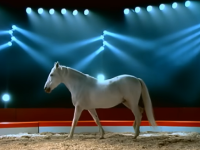Cannes festival. Oscar-nominated Greek director Yorgos Lanthimos « The Lobster »

SEAFOOD. Greek writer-director Yorgos Lanthimos, whose first three films Kinetta, Oscar-nominee Dogtooth and Alps have raised a cult following around the world, makes a practically effortless transition to the big leagues with his latest, the hilarious and haunting surreal parable The Lobster.
A near-future-set tale about a world where citizens must choose a mate or be turned into animals, this marks Lanthimos’ first film in English, his first with major international stars and his first Cannes-competition contender. The stakes are high, but the director and key collaborators raise their game and the movie is boosted by the sort of eclectic acting line-up not often found outside the confines of a Woody Allen or Wes Anderson film. The result is a richly rewarding but often very disturbing, even harrowing work, and while the cast have clearly embraced the chance to go dark, make-up free and explore a different sort of method, even arthouse-friendly audiences may balk at this strange-flavored brew. In the future, however, it might just be recognized as a classic example of a genre only now just beginning to form.
Although the film was shot entirely in Ireland, particularly in and around a luxurious resort in County Kerry, the characters’ hotel buffet of European and American accents deracinates the setting. This could be happening anywhere, but it’s probably somewhere in Europe, and those who have been watching the political drama unfolding between Lanthimos’ native Greece and the European Union might see a point being made here about the cultural homogenization that’s going on across the continent. Likewise, there’s no mention of when this is all meant to be unfolding or how freaky science manages to turn people into animals, so in terms of genre this could only be described as sci-fi in loosest sense. The closest correlatives in literature would the semi-abstract, magical-realist, parallel-world fictions by the likes of Jorge Luis Borges, Jose Saramago or J.G. Ballard.
It’s only later that we learn that the protagonist (Colin Farrell) is named David, but when we first meet him, he’s just a slightly overweight everyman with glasses who’s just been dumped by his wife. That’s unfortunate because it means he has to report to a residential center where he must find a new life partner in 45 days or submit to zoological conversion, a fate briskly laid out by the hotel manager (Broadchurch’s Olivia Coleman, deliciously crisp.) At least one has a choice of what animal one will be turned into, and David chooses lobster, because he likes the sea. (Fans of Friends will recall that lobsters are also supposedly animals that mate for life, although according to zoologists they’re actually more like serial monogamists.)
With its self-contained world run by absurd, but rigidly observed laws, the first half of the film is strongly reminiscent of Lanthimos’ Dogtooth, with its isolated family, and Alps with its Situationist acting troupe, but on a bigger, broader scale. The residents only know each other by their room numbers or — satirizing the language of screenwriting manuals — their “defining characteristic,” hence David’s new friends are called, in both dialogue and the end credits, “Lisping Man” (John C. Reilly) and “Limping Man » (Ben Whishaw). Like users of online dating sites, they fixate on finding similar characteristics in prospective mates, although that creates a challenge for anyone considering hooking up with one woman (Dogtooth’s Angeliki Papoulia) who is renowned for her utter lack of empathy. Fortunately for her, she excels at capturing “loners,” those who have broken away from the enforced monogamy of the current order and live in celibate packs in the nearby woods. The heartless woman has been so successful at bagging loners during the center’s organized hunts that she’s earned over a hundred extra days of human existence.
Delivering their best deadpans, Lanthimos and the cast work all this up in a fine froth of absurdist comedy as alliances are forged and broken, and prospective couples are consoled that if there’s any marital disharmony, they can be given children to fix that. David looks like he may have cracked the way to a happy union of convenience with the heartless woman, until (spoiler alert) she tests his commitment to heartlessness by killing Bob, the sweet shepherd dog that used to be his brother.
Some viewers may find this sudden intrusion of violence too challenging, especially since it abruptly flips the film’s tonalities upside down, and what had been up to this point a larky satire with umbral edges turns into a much more menacing fable with occasional flashes of comedy. Thankfully, a romantic spark is allowed to add some emotional warmth to second act when David meets Rachel Weisz, hitherto heard only as a chatty narrator. She’s a short-sighted loner David is drawn to when he joins the outcasts in the woods. When they’re compelled to take cover as a married couple on trips to the city, life starts to imitate art but with dangerous consequences given how doggedly opposed the outcast loner’s leader (Seydoux) is to love between loners.
There’s no simple takeaway message at the end — which, if truth be told, closes the proceedings with an anti-climactic, overly ambiguous whimper — but the sense that all involved have completely committed to Lanthimos’ tantalizingly inchoate vision is palpable. Co-screenwriter Efthymis Filippou’s collaboration with the director is faithfully served by director of photography Thimios Bakatakis,using lots of long lenses and natural lighting to create stunningly composed tableaus, and editorYorgos Mavropsaridis smoothing down the tonal shifts to a glassy sheen. Skilled Brit techniciansJacqueline Abrahams on production design and Sarah Blenkinsop on costume help to service the vision of an elegantly appointed, bureaucratic but distinctly fascistic dystopia that’s not so far off how we live now.










